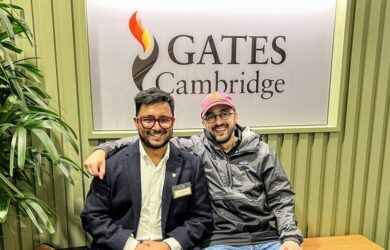Yen-Chun Chen wanted to be a politician when she was a teenager. She started her academic career studying political science, but then realised that theory had nothing to do with practice and switched to social work. She now hopes that she can have more influence on shaping policy through her academic work or working in the civil service.
Her main interest is in family life. Not only has she studied the impact of migration on families in her native Taiwan, but she now plans, with the help of a Gates scholarship, to study how the increase in women who work is affecting their role as mothers.
For her PhD in Sociology she will compare the situation in the UK and Taiwan. “I want to look at the different expectations of women and how this impacts on their roles as mothers, how they negotiate their different roles, how they cope with the dilemma of being a working mum,” she says.
Yen-Chun came to be interested in studying family dynamics after doing an undergraduate degree in political science and social work at Taiwan National University, followed by an MSc at Utrecht University in the Netherlands focusing on migration and ethnic relationships and an MPhil at Cambridge on family sociology.
During her undergraduate degree course, she became interested in marriage migrants – women from south east Asia who come to Taiwan to marry – after she worked as a volunteer for the Pearl S. Buck Foundation, an NGO which specialised in marriage immigrants. She says many men in low-income jobs in Taiwan have difficulty finding a marriage partner since tradition dictates that men have a higher educational and occupational level than their wives and more and more women are working and rising up the social ladder. Due to the lack of Taiwanese women who will marry them and their duty to pass on their family name, these men often turn to the marriage market and buy a wife from a poorer country, such as Vietnam or Cambodia.
Yen-Chun says the women who come to Taiwan are stigmatised and discriminated against. Those who do not have good command of Mandarin are most affected since they are often isolated. Many are not allowed contact with their families for fear they will send money back to help their families or abandon their husbands once they get citizenship. Many become victims of domestic violence and she says those who report attacks are not taken seriously by police. “Most want to be real citizens and have a family,” she says.
At the Foundation, Yen-Chun gave advice to migrants on how they could access support. She worked there for two years during the fourth and fifth year of her undergraduate degree.
She says she took the course because she wanted to be a politician and change the lives of underprivileged people. She got into politics at high school. However, in her first year at university she took part in a student mayoral campaign and realised that the course was not related to real-life politics. “I realised that if I really wanted to help people I had to do something more practical,” she says.
She decided to study social work. Starting with the idea that she want to do something for people who had suffered from natural disasters such as typhoons,by her second year she was doing voluntary work for a student association which helped Aboriginal children, elderly people living on their own and people living in hospital. “I appreciate very much what I have learnt from every type of volunteer work I am able to participate in and I learn from it,” she said.
She hopes to continue to combine her academic studies with her voluntary work while she does her PhD. “Life is not just about studying. I want to do something for society,” she says. At Cambridge she already does two voluntary jobs, for the Mountain Trust and for the Humanitarian Centre, whose newsletter she edits.
She decided to study at Cambridge because her boyfriend was doing a post-doc at the university and also because she finds the city very inspiring.
Yen-Chun is based at Queen’s College. She hopes eventually to become a government officer or to stay in academia. She says more politicians in Taiwan are now taking heed of academic research and using it to form policy. “Either way, I hope to influence policy,” she says.












